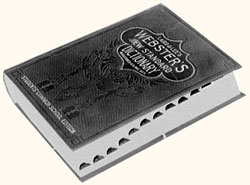|



Words
 |
A
“fifth column.” A “quisling.” From
“appeasement” to “Zionism,” new
words left an indelible imprint on our understanding of
the world.
During
the 20th century, the English language underwent constant
change as a host of new words entered the vocabulary. |
Webster's
new standard dictionary front cover.
Theodor Horydczak,photographer.
Created/Published ca. 1920-ca. 1950.
Library of Congress. |
Changes
in language aren’t mere curiosities. Rather, they reflect
fundamental changes in everyday life; new scientific discoveries;
technological innovations; new commercial products; shifting values;
changes in the life stages; and migration from abroad. In short,
language is an index to historical events, to social change, and
alterations in peoples’ understanding of themselves.
Key
Questions:
1.
What do you think were the sources of the new words?
2.
What do these new words tell us about the changes that have
taken place in American society and culture in the 20th century?
|
